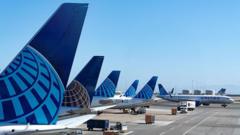Stakeholders in the aerospace sector, which has historically maintained a significant trade surplus, are cautioned about the implications of new tariffs. The industry, expected to export approximately $125 billion this year, leans heavily on specialized global suppliers for critical components. Eric Fanning, president of the Aerospace Industries Association, stressed the importance of a balanced approach that strengthens domestic supply chains without undermining the established trade relations essential for aerospace competitiveness.
While Boeing assesses the current tariff impact as manageable, suppliers have reported significant potential cost increases. Companies like RTX and GE Aerospace anticipate critical financial burdens due to tariffs, which could run into the hundreds of millions. The aerospace sector has witnessed tensions between the U.S. and EU over subsidies, leading to a strained relationship between major manufacturers Boeing and Airbus. Recent agreements seek collaboration against international competition, particularly regarding China's industry foothold.
This investigation presents both challenges and opportunities for the aerospace industry as it navigates the balance between fostering local production and maintaining its robust global presence.
Niraj Chokshi covers aviation and transportation industries.
While Boeing assesses the current tariff impact as manageable, suppliers have reported significant potential cost increases. Companies like RTX and GE Aerospace anticipate critical financial burdens due to tariffs, which could run into the hundreds of millions. The aerospace sector has witnessed tensions between the U.S. and EU over subsidies, leading to a strained relationship between major manufacturers Boeing and Airbus. Recent agreements seek collaboration against international competition, particularly regarding China's industry foothold.
This investigation presents both challenges and opportunities for the aerospace industry as it navigates the balance between fostering local production and maintaining its robust global presence.
Niraj Chokshi covers aviation and transportation industries.




















